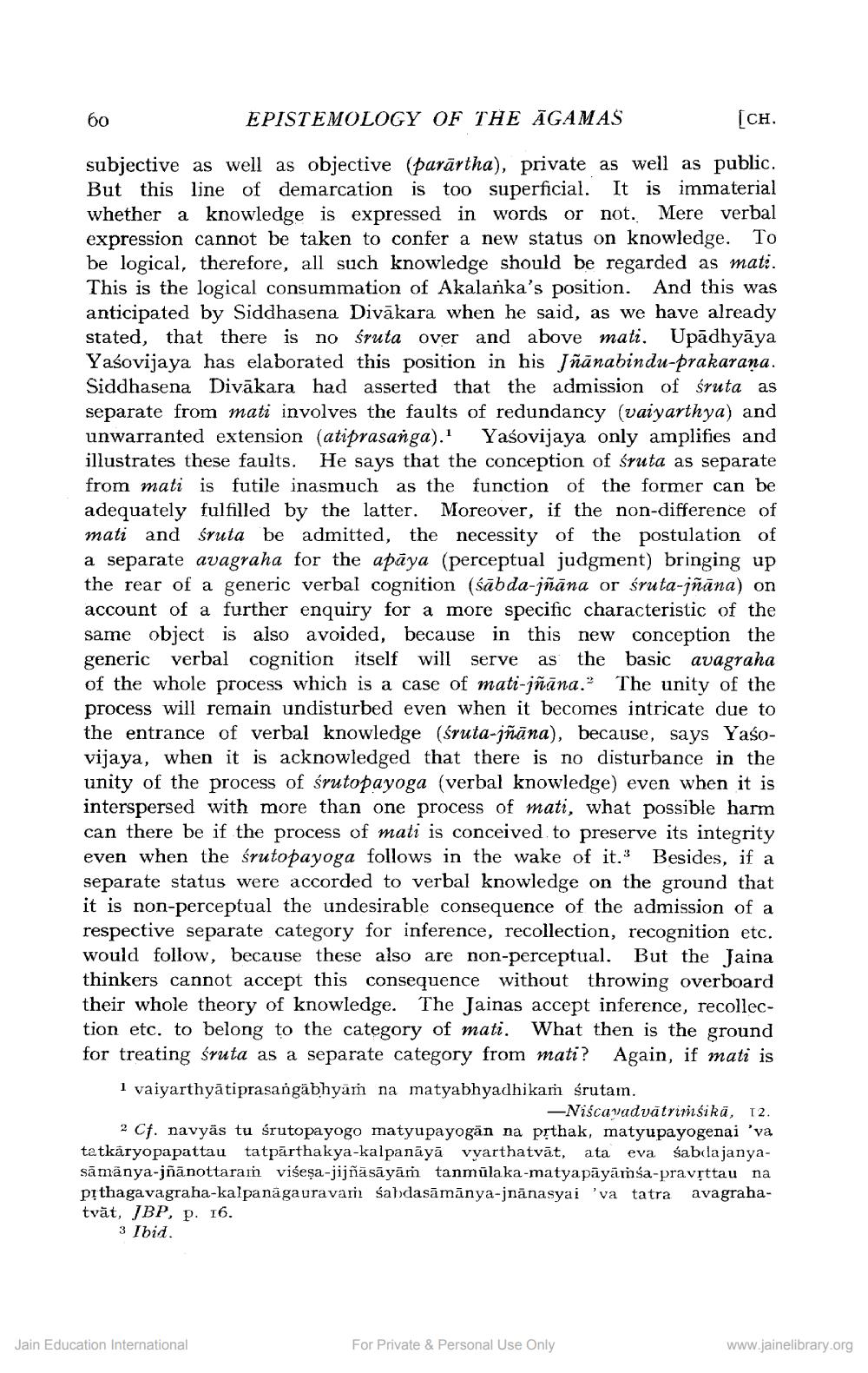________________
60
EPISTEMOLOGY OF THE ĀGAMAS
[CH.
subjective as well as objective (parārtha), private as well as public. But this line of demarcation is too superficial. It is immaterial whether a knowledge is expressed in words or not. Mere verbal expression cannot be taken to confer a new status on knowledge. To be logical, therefore, all such knowledge should be regarded as mati. This is the logical consummation of Akalanka's position. And this was anticipated by Siddhasena Divākara when he said, as we have already stated, that there is no śruta over and above mati. Upādhyāya Yasovijaya has elaborated this position in his Jñānabindu-prakarana. Siddhasena Divākara had asserted that the admission of śruta as separate from mati involves the faults of redundancy (vaiyarthya) and unwarranted extension (atiprasanga). Yaśovijaya only amplifies and illustrates these faults. He says that the conception of śruta as separate from mati is futile inasmuch as the function of the former can be adequately fulfilled by the latter. Moreover, if the non-difference of mati and śruta be admitted, the necessity of the postulation of a separate avagraha for the apāya (perceptual judgment) bringing up the rear of a generic verbal cognition (śābda-jñāna or śruta-jñāna) on account of a further enquiry for a more specific characteristic of the same object is also avoided, because in this new conception the generic verbal cognition itself will serve as the basic avagraha of the whole process which is a case of mati-jñāna." The unity of the process will remain undisturbed even when it becomes intricate due to the entrance of verbal knowledge (śruta-jñāna), because, says Yaśovijaya, when it is acknowledged that there is no disturbance in the unity of the process of śrutopayoga (verbal knowledge) even when it is interspersed with more than one process of mati, what possible harm can there be if the process of mati is conceived to preserve its integrity even when the śrutopayoga follows in the wake of it.3 Besides, if a separate status were accorded to verbal knowledge on the ground that it is non-perceptual the undesirable consequence of the admission of a respective separate category for inference, recollection, recognition etc. would follow, because these also are non-perceptual. But the Jaina thinkers cannot accept this consequence without throwing overboard their whole theory of knowledge. The Jainas accept inference, recollection etc. to belong to the category of mati. What then is the ground for treating śruta as a separate category from mati? Again, if mati is
1 vaiyarthyātiprasangabhyam na matyabhyadhikam śrutam.
-Niscavadvātrimsikā, 12. 2 Cf. navyäs tu śrutopayogo matyupayogān na prthak, matyupayogenai 'va tatkáryopapattau tatpārthakya-kalpanāyā vyarthatvāt, ata eva sabda janyasāmãnya-jñānottararn višeşa-jijñāsāyām tanmülaka-matyapāyamsa-pravsttau na pithagavagraha-kalpanāgauravari sabdasāmānya-jnānasyai 'va tatra avagrahatvät, JBP, p. 16.
3 Ibid.
Jain Education International
For Private & Personal Use Only
www.jainelibrary.org




